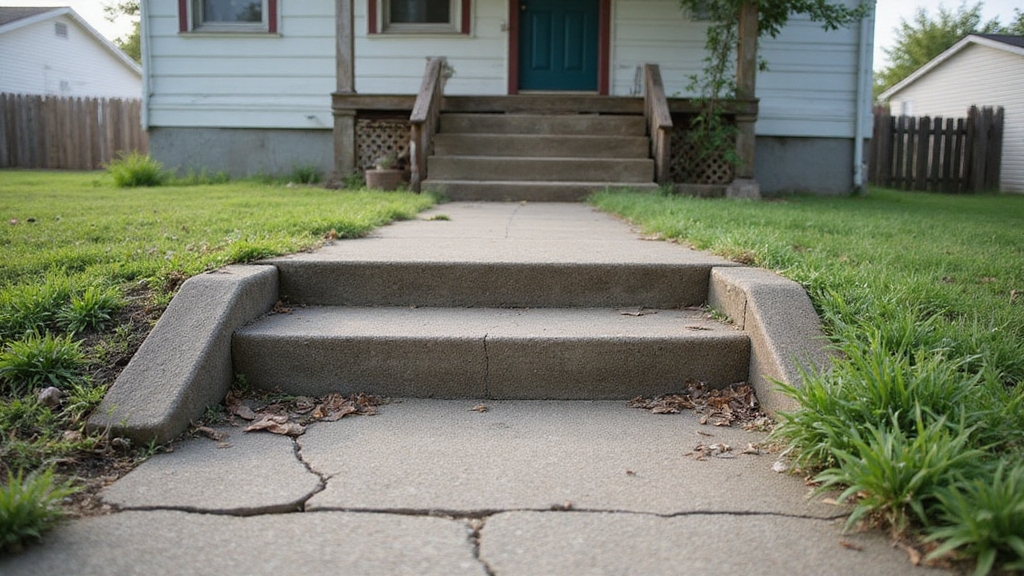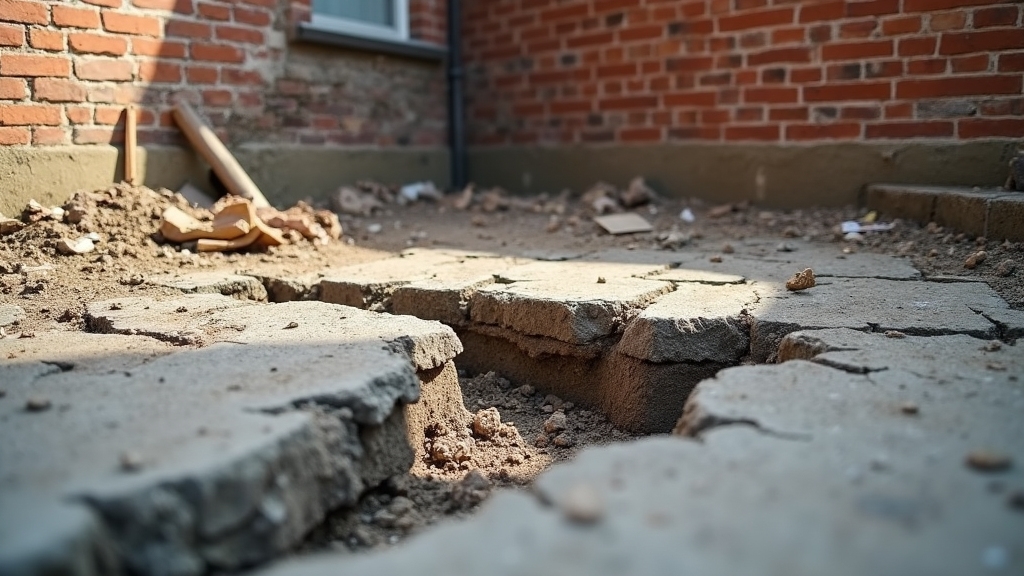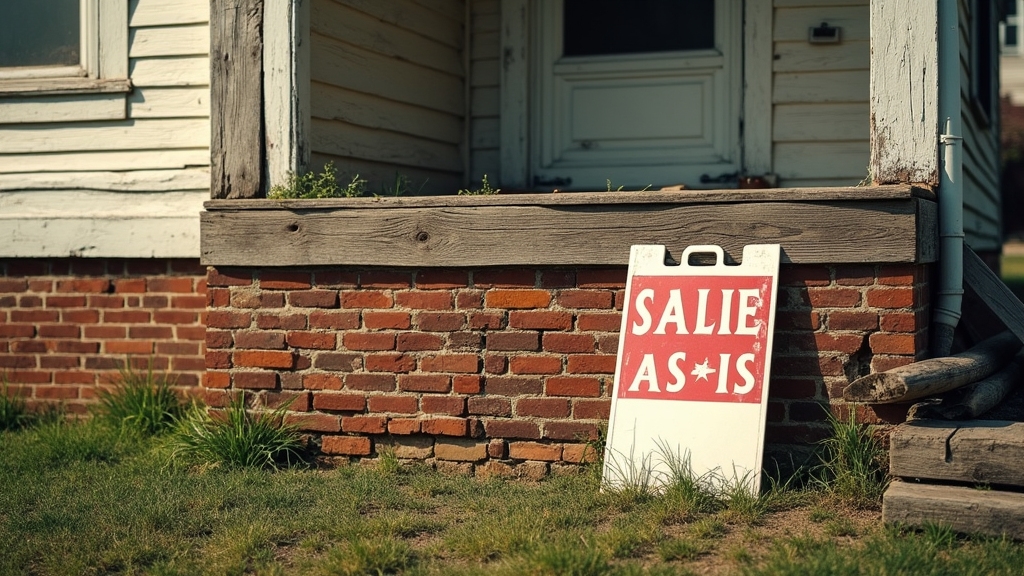Selling a house with foundation damage is a big challenge. Most buyers are cautious about homes with structural problems. You may worry about getting a fair price or even finding a buyer at all.
Foundation issues can scare away potential buyers and lower your home’s value. Repairs are often expensive and time-consuming. You might feel overwhelmed by legal rules and the risk of deals falling through.
You can sell a house with foundation damage as-is by following a clear plan and targeting the right buyers. You need to understand your home’s condition, disclose honestly, and price it right.
Smart marketing will help you reach investors or buyers who see potential. This blog will show you how to sell your house as-is and avoid common pitfalls.
Key Takeaways
- Fully disclose all known foundation issues and provide inspection or repair reports to potential buyers.
- Price the property competitively by subtracting estimated repair costs and referencing local sales of similar as-is homes.
- Market the house honestly as an as-is sale, targeting investors, cash buyers, and flippers who accept such risks.
- Obtain multiple repair estimates from licensed professionals to inform buyers and strengthen your negotiation position.
- Highlight any positive features, such as location or investment potential, to attract serious as-is buyers despite the damage.
Understanding Foundation Damage and Its Impact on Home Value

Foundation damage lowers your home’s value. Buyers see it as a big problem and may offer less money. Lenders might not want to finance homes with these issues.
Moisture in the basement is not just a small issue. It can cause mold, damage concrete, and weaken the structure. These problems make your home less safe and harder to sell.
If you have not fixed the foundation, buyers often expect you to lower your price. They know repairs can be expensive. Selling your home as-is will usually mean less negotiating power.
If you understand these risks, you can plan better when selling. You may need to adjust your price or fix the foundation first. This knowledge helps you make better choices.
Before listing, conducting a title search is important to ensure there are no encumbrances or legal issues that could complicate the sale. Additionally, understanding the tax implications of selling an inherited property can help you plan financially, especially if the property has appreciated in value since inheritance.
Assessing the Severity of Foundation Issues
You’ll need to identify visible structural cracks and assess any signs of settlement or shifting to determine how serious your foundation issues are. Pay close attention to horizontal cracks, uneven floors, and doors that won’t close properly—these can signal significant structural concerns. It’s wise to consult a licensed foundation inspector for a thorough, market-ready evaluation before listing your property.
Additionally, understanding the severity of foundation issues can help you decide whether repairs are necessary prior to sale or if an as-is sale is appropriate. Recognizing common signs of foundation damage can also aid in accurately conveying the property’s condition to potential buyers.
Identifying Visible Structural Cracks
Visible structural cracks are key signs of possible foundation problems. You must look for these cracks during any property inspection. Cracks can show where the building is under stress.
Inspect both inside and outside walls carefully. Focus on cracks wider than 1/4 inch, diagonal lines, or stair-step cracks in brickwork. These patterns may mean the foundation needs repair.
Cracks near windows, doors, or in the basement often suggest shifting or settling. Document each crack’s location, length, and pattern if you find them. Good records help explain the property’s condition to buyers.
Buyers may avoid homes with visible cracks. If you know about the cracks, you can set fair prices and negotiate with confidence. Clear information helps attract buyers who are serious about repairs.
Evaluating Settlement and Shifting
Evaluating settlement and shifting is important to know how foundation damage affects a property. If the foundation settles or the soil shifts, the property’s value can drop. These issues also make buyers less confident.
You should look for signs like sloping floors, sticking doors, and cracks in walls. If floors slope, the foundation may have settled and this can be serious. Gaps around windows or walls may show the structure has shifted.
If you see these symptoms, the damage might be minor or more serious. An accurate check helps you set a fair price. It also helps you negotiate with buyers more effectively.
Consulting Professional Foundation Inspectors
Consulting professional foundation inspectors gives you a clear picture of your home’s condition. Licensed inspectors use tools to check for uneven settling, cracks, and moisture. Their findings are trusted by buyers and lenders.
If you rely on myths or guesswork, you may misjudge the seriousness of the problem. Only a certified expert can tell the difference between cosmetic issues and real structural damage. Their detailed report explains the damage, needed repairs, and costs.
This report helps you negotiate with buyers confidently. When you provide professional documentation, buyers are more likely to trust your disclosures. If your property is compared to others, this transparency can make your home sell faster.
Getting a Professional Inspection and Report
A professional inspection and report are important for properties with foundation problems. A licensed structural engineer or inspector can find out exactly what is wrong. If you have this report, you know what repairs are needed and how serious the issues are. Having a detailed inspection report can also help prevent future disputes or surprises during closing. The report explains the causes of damage and how quickly repairs should be made.
Buyers want clear information before making an offer, especially if there are known problems. If you provide an official report, you make your property more trustworthy. Additionally, a thorough inspection can reveal hidden damage that might otherwise be overlooked, helping you set a fair price and avoid surprises later. Sellers can use the inspection report to set a fair price and answer buyers’ questions. If you are selling as-is, this report shows you are honest about the condition. This helps you set realistic expectations for everyone involved.
Legal Disclosure Requirements for Sellers

Sellers must follow the law and disclose all known foundation damage when selling a home. If you hide these issues, you risk lawsuits or canceled sales. State laws often require written proof, such as inspection reports or repair records. Making Moves can help facilitate quick sales, but full disclosure remains essential to avoid legal complications. Neighborhood comps can influence the value of a property, and understanding their role can help in assessing the potential impact of foundation issues.
Buyers expect clear and honest information about structural problems. Accurate disclosures help build trust and can prevent future disputes. If you are unsure what to disclose, ask your real estate agent or lawyer. Providing full details and documents is the best way to meet legal requirements. Always check your state’s rules to avoid mistakes. If you do not comply, you could face financial penalties.
Weighing Repair Options Versus Selling As-Is
You’ll need to accurately estimate foundation repair costs and weigh them against the potential increase in your home’s market value. Consider how these repairs could affect your ability to attract traditional buyers versus cash investors seeking as-is properties.
Understanding the current demand for fixer-uppers in your local market will help you determine the most powerful strategy. Conducting a proper home valuation can help you make informed decisions about whether to repair or sell as-is. Additionally, being aware of seasonal timing can optimize your sale, especially if market activity aligns with your preferred selling period.
Assessing Repair Costs
Assessing repair costs is important once you find foundation damage. Accurate estimates help you decide how to proceed. Costs depend on the type and extent of the damage.
A licensed engineer or trusted contractor should inspect the foundation. The inspection should reveal the damage and its possible causes. If you get a report, it will include recommended repairs.
Foundation repair prices can vary a lot. Minor fixes are usually less expensive than major structural repairs. If you compare several estimates, you can find fair pricing.
You should also consider extra costs. These may include permits, engineering fees, and fixing cosmetic damage after repairs. If repairs cost too much, selling as-is could be a better option.
Impact on Home Value
Foundation issues usually lower your home’s value. Most homes with structural damage sell for 10% to 20% less than similar homes. Buyers worry about repair costs and possible risks.
A damaged foundation can lead to a lower appraisal. If you plan to sell, fewer buyers may show interest. Lenders may also hesitate to approve loans for homes with these problems.
Visible damage, like cracks or sloped floors, reduces curb appeal. If you repair or improve the home, you might recover some value. Always review local market data before making a decision.
Attracting As-Is Buyers
Listing your home as-is can attract buyers who want investment properties or discounted homes. These buyers often include cash buyers, investors, and house flippers. If you want a quicker sale, selling as-is is a good option.
Home staging can help highlight your property’s best features. Make the outside look nice and keep spaces tidy and functional. If you are honest about foundation problems, buyers will trust your listing more.
Your location and school district can make buyers overlook the foundation damage. If your home is near popular amenities, mention them. These points can help balance any worries about repairs.
Pricing your home correctly is important if you want to attract more as-is buyers. If you market directly to the right audience, you can often sell faster. This saves you time and avoids costly repairs.
Determining the Right Asking Price
Foundation damage lowers a property’s market value. You should set your price based on clear, local data. If you price too high, buyers may walk away. Foundation problems decrease value, so use local data to price accurately—overpricing will drive buyers away.
Look at recent sales of homes with similar foundation issues. These examples can guide your asking price. Use only properties sold as-is and with damage disclosed.
Subtract the estimated cost of repairs from the regular market value. If you have a quote for repairs, use that number. This helps buyers see your price as fair. Understanding market valuation can further assist in setting a realistic price.
If you want to attract investors, offer a lower price. Buyers expect a discount to cover their risk. A competitive price can help your property sell faster.
Ask a real estate agent for advice if you are unsure. Local experts know what buyers expect. They can also help you set a realistic price.
Reliable and Guaranteed Sale Process approaches can also be valuable when selling properties with foundation issues, ensuring a smooth transaction despite potential complications.
Marketing Strategies for Homes With Structural Problems

To sell a home with structural problems, clear and honest marketing is essential. Buyers need to know about the foundation issues up front. Accurate information can help attract serious buyers.
Listings should mention any foundation settlement or repairs. Sellers should share engineering reports and explain any past or possible repair methods. Using terms like “pier and beam stabilization” or “epoxy injection repairs” can build trust.
Photos of the problem areas and any repairs should be included. Before-and-after images are helpful if work has been done. These show buyers what improvements were made.
If the home has good location or investment potential, sellers should highlight these features. Digital platforms and local investor networks can reach more interested buyers. Specialized real estate agents may also help sell properties with problems.
Addressing the issues directly can help gain buyer trust. Honest details set a listing apart in a tough market. If sellers are open about problems, buyers may feel more confident.
Additionally, providing full disclosure of property condition ensures compliance with legal disclosure laws and fosters transparency that can facilitate a smoother sale.
Targeting the Right Buyers and Investors
You’ll maximize your chances of a successful sale by targeting investor buyer types who specialize in distressed properties. Focus your marketing on cash buyers and real estate investors who understand as-is value and can move quickly without financing contingencies.
By aligning your outreach with their risk tolerance and acquisition strategies, you’ll streamline negotiations and increase your property’s appeal. Recognizing market fluctuations can also help time your sale to maximize returns. Additionally, avoiding legal oversights and ensuring transparent disclosure can prevent future disputes and facilitate smoother transactions.
Identifying Investor Buyer Types
A house with foundation damage attracts certain types of real estate investors. These buyers use different strategies and have unique risk preferences. Knowing their types helps you negotiate better when foundation repairs or disclosures are needed.
Fix-and-flip investors buy damaged homes, repair them, and sell for a profit. Buy-and-hold landlords purchase discounted homes, fix the foundation, and rent them out. Wholesale investors sign contracts on distressed homes and sell those contracts to other buyers.
Redevelopers look for land or tear-down options and may not care about foundation issues. Each investor type approaches deals differently. If you understand their goals, you can tailor your negotiation strategy.
Marketing to Cash Buyers
To market to cash buyers, identify investors who buy homes with foundation issues. Focus on those interested in repairs and renovations. If you target these groups, your marketing will attract serious cash buyers.
Describe the property’s as-is condition and clearly mention all foundation problems. Buyers appreciate honesty and will trust your listing more. If you show transparency, you can build credibility quickly.
Highlight the investment potential by sharing recent sales of fixed properties nearby. Use simple technical words like “foundation repair” and “basement waterproofing.” If you use these terms, buyers will know you understand their needs.
List your property on real estate websites and share it with investor networks. Cash buyer lists are useful if you want quick offers. These buyers often close deals without needing traditional loans.
Highlighting the Home’s Positive Features
Emphasizing your home’s positive features can help attract buyers, even if there are foundation concerns. Buyers often focus on a property’s strengths when deciding to schedule a visit. Showcasing upgrades and special features can improve the home’s appeal.
Mature trees and neat landscaping create strong curb appeal. Well-kept lawns and colorful flower beds make a good first impression. If you have these, highlight them in your listing photos.
Modern updates inside the home are very attractive. Recent upgrades like new flooring or energy-efficient appliances can catch buyers’ attention. Updated lighting or smart features also add value.
Spacious rooms and lots of natural light are important to many buyers. Open layouts and functional spaces should be mentioned in your marketing. If your home has these qualities, be sure to highlight them.
Unique architectural details can make your home memorable. Renovated kitchens or bathrooms are strong selling points. If these features exist, include them in your property description.
Negotiating Offers With Transparency
To get the best deal with foundation damage, share your structural assessment results with buyers. Always provide repair estimates and related documents. Honest information builds trust and encourages fair negotiations.
If buyers ask for large price cuts, check if their requests match the actual repair costs. You can use local sales data for similar properties to support your price. Data-driven responses help you stay firm but fair.
Transparent negotiation shows you are professional and reasonable. This approach reduces surprises and helps both sides agree on the property’s true value. If you negotiate openly, you are more likely to close the sale smoothly.
Managing Buyer Expectations During Showings
During showings, you should proactively disclose all known structural issues to foster trust and minimize post-inspection renegotiation. Present detailed repair cost estimates so buyers can accurately assess the investment required. This approach positions you as a transparent seller and helps filter out prospects who aren’t prepared for remediation.
Clearly Disclose Structural Issues
You must clearly share all structural problems if you want to sell a house with foundation damage. This is required by law in most states. Proper disclosure protects you from possible legal issues later.
Use the disclosure form to list all repairs or note if none were made. Show buyers any visible damage when they visit. Point out foundation repairs or areas with no work done.
Buyers should see cracks in basement walls or floors. Show any steel piers or wall anchors from past repairs. Tell buyers if floors are uneven or if doors and windows do not close right.
Clear communication shows honesty and helps buyers trust you. If you hide problems, you could face serious trouble later. Always answer buyer questions about the home’s condition.
Highlight Repair Cost Estimates
Providing buyers with clear repair cost estimates helps them understand what to expect. You should get written quotes from licensed contractors for all needed foundation repairs. Share these estimates during home showings so buyers can see the likely costs.
Itemized cost breakdowns for repairs such as pier installation or crack repair allow buyers to compare your home to others. If buyers see detailed estimates, they can make informed decisions about your property. This approach shows transparency and builds trust.
If you present foundation damage as a specific, solvable problem, buyers are more likely to consider your home. They will know what repairs are needed and can plan for them. Clear estimates help buyers move forward with confidence.
Navigating Appraisals and Home Inspections
Appraisals and home inspections are required for most home sales. Both steps help show the true condition of your property, especially the foundation. If your home has foundation issues, these checks can affect the sale price.
Inspectors look for cracks, settling, or water damage in the foundation. They also check for any signs that the structure is unsafe. If inspectors find problems, this may cause concern for buyers.
Home inspectors look for cracks, settling, and water damage in the foundation, which can raise concerns for potential buyers.
Appraisers use the inspection report to set your home’s value. If foundation damage is found, your home may be valued lower. Accurate inspection reports help buyers know what to expect.
Building permits for any repairs make your home more appealing to buyers. Permits show repairs were done properly and legally. If you have records of repairs, this can build trust with buyers.
Detailed disclosures about repairs or damage help avoid surprises later. Honest information can make negotiations smoother. If buyers feel informed, they may be more willing to move forward.
Closing the Sale With Foundation Damage
Foundation damage affects how you close the sale of your home. Sellers must disclose all known foundation problems in writing. Buyers may ask for a lower price or repairs after seeing the inspection report.
Home staging can help by showing the best parts of the house. Good curb appeal or new interiors can balance concerns about the foundation. If other homes nearby had similar issues, those sales may affect your price.
A real estate agent can help you with the paperwork and negotiation. The title company will make sure all legal steps are complete. If you address problems early, closing will be faster and expectations will be clear for everyone.
Avoiding Common Mistakes When Selling As-Is
Selling your house as-is with foundation damage can lead to common mistakes that lower your sale price. It is important to avoid these errors to get the best result.
Many sellers skip getting a certified structural engineer’s report. If buyers do not see proof of stability, they may walk away. This report helps you keep stronger negotiating power.
Sellers sometimes fail to fully disclose foundation issues. If you hide damage, you risk legal problems and insurance claim delays. Full disclosure protects you from future disputes.
Some owners set the asking price too high. If you do not account for repair costs, buyers may lose interest. This can make your home stay longer on the market.
Financing is often a challenge if a property has foundation damage. Lenders may refuse loans unless there is proof the foundation is safe. If you plan ahead, you can avoid delays or lost deals.
Proper documentation and openness will make buyers more confident. If you communicate clearly, the sale process becomes smoother and faster.
Conclusion
If you need to sell a house with foundation damage, you can still find a solution. If you are honest about the issues and provide clear documentation, buyers will be more likely to trust your listing. If you price the home appropriately, you can attract serious investors and cash buyers.
If you want a fast and stress-free sale, Limitless Homes of KC can help. We buy houses for cash, even if they have foundation problems. If you choose to sell as-is, you can avoid repairs and move forward quickly.
If you are ready to sell your house with foundation damage, contact us today. We will provide a fair cash offer and handle the process for you. Let Limitless Homes of KC help you take the next step with confidence.

